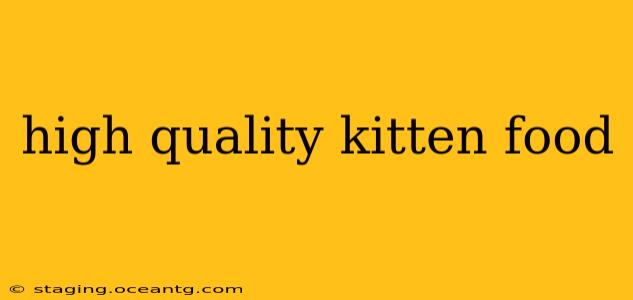Bringing a new kitten home is an exciting time! Ensuring their health and happiness starts with providing the best possible nutrition. Choosing high-quality kitten food is crucial for their growth, development, and overall well-being. This guide will help you navigate the world of kitten food and select the perfect option for your furry friend.
What Makes Kitten Food "High-Quality"?
High-quality kitten food isn't just about a catchy brand name or cute packaging. It's about the ingredients and their nutritional profile. Look for these key characteristics:
-
Named Meat Sources: The first few ingredients should be clearly identified meat sources, such as "chicken," "salmon," or "turkey," not vague terms like "meat by-products." This ensures your kitten receives a good source of high-quality protein, essential for muscle development and growth.
-
High Protein Content: Kittens require significantly more protein than adult cats. Aim for foods with a protein content of at least 30%. This helps support their rapid growth and development.
-
Real Meat, Not Fillers: Avoid foods with excessive fillers like corn, wheat, and soy. These offer little nutritional value and can be difficult for kittens to digest. Real meat should be the star of the ingredient list.
-
Essential Nutrients: Look for food formulated specifically for kittens, as these contain the right balance of vitamins and minerals crucial for their growing bodies. These include taurine, arachidonic acid, and other essential fatty acids vital for healthy eyesight, brain development, and overall health.
-
Appropriate Fat Levels: Healthy fat is essential for energy and brain development, but too much can lead to obesity. Look for a balance of healthy fats, again focusing on named sources (like chicken fat) rather than generic "animal fat".
-
Avoid Artificial Additives: Opt for foods with minimal artificial colors, flavors, and preservatives. These can have negative long-term effects on your kitten's health.
What Are the Best Brands of Kitten Food?
Many reputable brands produce high-quality kitten food. However, the "best" brand will depend on your kitten's individual needs and preferences. It's always best to consult with your veterinarian to determine the most suitable food for your specific kitten. They can provide personalized recommendations based on factors such as breed, age, and any pre-existing health conditions. Some commonly recommended brands include: (Please note, this is not an exhaustive list and should not be considered an endorsement, always check your vet): Royal Canin, Hill's Science Diet, Purina Pro Plan, Wellness Complete Health.
How Much Should I Feed My Kitten?
Feeding guidelines are typically printed on the food packaging. However, these are just general guidelines. Adjust the amount based on your kitten's age, activity level, body condition, and individual needs. A slightly overweight kitten might need a slight reduction in food, while a very active kitten might need slightly more. Monitor your kitten's weight and adjust food portions accordingly. Consult your veterinarian if you're unsure about appropriate portion sizes.
What are the signs of a high-quality kitten food?
The signs of high-quality kitten food are reflected in your kitten's health. A healthy kitten will have shiny fur, bright eyes, firm stool, and a playful attitude. If you notice any changes in your kitten's health, such as weight loss, lethargy, or changes in appetite, consult your veterinarian.
Can I feed my kitten adult cat food?
No, adult cat food is not appropriate for kittens. Kittens have different nutritional requirements than adult cats, needing a higher concentration of protein and specific nutrients to support their rapid growth. Feeding adult food to kittens can lead to nutritional deficiencies.
What is the best type of kitten food: wet or dry?
Both wet and dry kitten food can be part of a healthy diet. Wet food often has a higher moisture content, which can be beneficial for urinary tract health. Dry food can be a convenient and cost-effective option. Many owners opt for a combination of both to offer variety and meet their kitten's needs. Ultimately, the best type will depend on your kitten's preferences and any specific dietary requirements.
How often should I change my kitten's food?
Sudden changes in food can upset your kitten's digestive system. If you need to switch foods, do so gradually over 7-10 days, mixing the new food with the old. This allows your kitten's digestive system to adapt and minimizes the risk of digestive upset.
Choosing high-quality kitten food is a crucial investment in your kitten's health and happiness. By understanding the key characteristics of quality food and consulting your veterinarian, you can ensure your little one receives the optimal nutrition they need to thrive. Remember to always monitor your kitten's health and adjust their diet accordingly.
